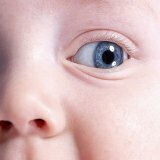Kidney disease in newborns

Kidney diseases in newborns occur with the same frequency as in children from 1 year to 14 years. In this period of childhood it is very important to diagnose in time, which will prevent complications from the kidneys and other organs. Most kidney anomalies in 9% of cases occur without clinical manifestations. The most crucial time, when the prevention of kidney disease development is real - the period of pregnancy.
There are 3 main groups of kidney diseases in newborns.
Congenital and hereditary diseases( polycystic kidney, renal dysplasia, renal agenesis, Finnish type of hereditary nephrotic syndrome, hydronephrosis, kidney doubling, dystopia, etc.).
Kidney diseases acquired: interstitial nephritis, thrombosis of renal vessels, urinary tract infections. Interstitial nephritis develops during hypoxia, the administration of certain drugs, and viral infections. With the frequent administration of hyperosmolar solutions during the catheterization of the umbilical vessels, thrombosis of the renal vessels may occur, which subsequently threatens arterial hypertension and renal insufficiency. Urinary tract infections are diagnosed in about 1% of newborns.
Ischemic nephropathy is a renal dysfunction that forms with ischemia of the kidney tissue. Insufficiency of the blood supply to the kidneys develops in connection with the open arterial duct, hypovolemia of the great circle of blood circulation, various infectious diseases.
Isolate acute renal failure, which is a complication of kidney disease and the result of deep ischemia of the kidney tissues. It manifests itself primarily by increasing the concentration in the blood of creatinine. In newborns with acute renal failure, the following symptoms are observed: edema, oliguria, metabolic acidosis, hyperkalemia, azotemia.
Renal diseases in newborns can occur under various symptoms. Therefore, the parents should be alerted:
- if the newborn has skin of icteric color( sometimes this is the only manifestation of kidney disease);
- if the infant has a loose stool and vomiting;
- high body temperature, occurring suddenly and persisting for a short time;
- kidney disease can occur with the defeat of other organs of the newborn's body;
- absence of urination immediately after birth and in the first days of life;
- rare or frequent urination;
- sudden convulsive seizure for no apparent reason, as well as manifestations similar to meningitis;
- a newborn's anxiety during urination.
Kidney disease in a newborn can begin to acutely with manifestations of the above symptoms, but it can also be asymptomatic. In this case, kidney disease can be detected accidentally.
It should be borne in mind that neonates may have a variety of borderline states due to the period of adaptation, so that the same symptoms can be observed as in kidney disease. A nephrologist or neonatologist can distinguish pathology from borderline conditions.
How should babies be monitored for kidney disease?
It is necessary to take urine for analysis:
- immediately after the newborn is discharged from the hospital;
- before preventive vaccination;
- after vaccination in any pathological reactions to them;
- for intercurrent diseases;
- two weeks after the neonatal recovery from intercurrent illness;
- if the newborn has had intestinal infections;
- with a bad gain in weight.
If there is a hereditary predisposition, even if urinalysis is normal, ultrasound should be done.



